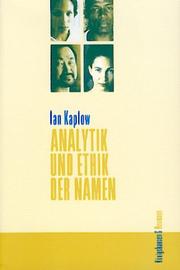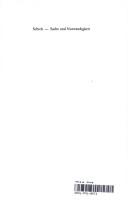| Listing 1 - 10 of 139 | << page >> |
Sort by
|
Book
ISBN: 0197537340 0197537359 0197537332 9780197537336 9780195144741 Year: 2021 Publisher: New York Oxford University Press
Abstract | Keywords | Export | Availability | Bookmark
 Loading...
Loading...Choose an application
- Reference Manager
- EndNote
- RefWorks (Direct export to RefWorks)
Our words & ideas refer to objects and properties in the external world; this phenomenon is central to thought, language, communication, & science. But great works of fiction are full of names that don't seem to refer to anything! This book explores the myriad of problems that surround the phenomenon of reference. How can words in language & perturbations in our brains come to stand for external objects? Reference is essential to truth, but which is more basic: reference or truth? How can fictional characters play such an important role in imagination & literature, & how does this use of language connect with more mundane uses? The book develops a framework for understanding reference, & the theories that other thinkers have developed about it. But it doesn't simply tell us what others thought; the book is full of new ideas, making for a vital final contribution from a seminal philosopher.
Book
Year: 1975 Publisher: Lausanne: L'âge d'homme,
Abstract | Keywords | Export | Availability | Bookmark
 Loading...
Loading...Choose an application
- Reference Manager
- EndNote
- RefWorks (Direct export to RefWorks)
Book
ISBN: 0816610452 Year: 1981 Publisher: Minneapolis (Minn.): University of Minnesota
Abstract | Keywords | Export | Availability | Bookmark
 Loading...
Loading...Choose an application
- Reference Manager
- EndNote
- RefWorks (Direct export to RefWorks)

ISBN: 3826022688 Year: 2002 Publisher: Würzburg : Königshausen und Neumann,
Abstract | Keywords | Export | Availability | Bookmark
 Loading...
Loading...Choose an application
- Reference Manager
- EndNote
- RefWorks (Direct export to RefWorks)
Identity (Psychology). --- Names. --- Reference (Philosophy).
Book
ISBN: 8842044296 9788842044291 Year: 1994 Publisher: Roma: Laterza,
Abstract | Keywords | Export | Availability | Bookmark
 Loading...
Loading...Choose an application
- Reference Manager
- EndNote
- RefWorks (Direct export to RefWorks)
Language and languages --- Reference (Philosophy) --- Reality.
Book
ISBN: 0691101280 Year: 1981 Publisher: Princeton (N.J.) : Princeton university press,
Abstract | Keywords | Export | Availability | Bookmark
 Loading...
Loading...Choose an application
- Reference Manager
- EndNote
- RefWorks (Direct export to RefWorks)
Essentialism (Philosophy). --- Object (Philosophy). --- Reference (Philosophy).
Book
ISBN: 9587840151 9789587840155 Year: 2018 Publisher: Bogotá, Colombia : Editorial Universidad del Rosario :; Ciudad de Mexico Universidad Autónoma Metropolitana, Unidad Cuajimalpa,
Abstract | Keywords | Export | Availability | Bookmark
 Loading...
Loading...Choose an application
- Reference Manager
- EndNote
- RefWorks (Direct export to RefWorks)
Reference (Philosophy) --- Russell, Bertrand, --- Frege, Gottlob,

ISBN: 3826028260 9783826028267 Year: 2005 Publisher: Würzburg Königshausen und Neumann
Abstract | Keywords | Export | Availability | Bookmark
 Loading...
Loading...Choose an application
- Reference Manager
- EndNote
- RefWorks (Direct export to RefWorks)
Necessity (Philosophy) --- Ontology --- Reference (Philosophy) --- Universals (Philosophy)
Book
ISBN: 9004385290 9004375635 Year: 2019 Publisher: Leiden ; Boston : Brill Rodopi,
Abstract | Keywords | Export | Availability | Bookmark
 Loading...
Loading...Choose an application
- Reference Manager
- EndNote
- RefWorks (Direct export to RefWorks)
This book investigates the importance of Ricoeur’s hermeneutics and poetics in rethinking humanities. In particular, Ricoeur’s insights on reference as refiguration and his idea of interpretation as a triadic process (which consists of mimesis 1 – prefiguration, mimesis 2 – configuration, and mimesis 3 – refiguration) will be applied to philosophy of science and to literary and historical texts. It will be shown that Ricoeur’s idea of emplotment can be extended and applied to scientific, literary and historical texts. This multidisciplinary research will include philosophy of science, metaphysics, hermeneutics, and literary theory.
Reference (Philosophy) --- Hermeneutics. --- Poetics. --- Ricœur, Paul.
Book
ISBN: 9780199693672 0199693676 0191739006 019870304X 9786613675736 0191629189 1280698772 Year: 2012 Publisher: Oxford: Oxford university press,
Abstract | Keywords | Export | Availability | Bookmark
 Loading...
Loading...Choose an application
- Reference Manager
- EndNote
- RefWorks (Direct export to RefWorks)
John Hawthorne and David Manley present an original treatment of the semantic phenomenon of reference and the cognitive phenomenon of singular thought. In Part I, they argue against the idea that either is tied to a special relation of causal or epistemic acquaintance. Part II challenges the alleged semantic rift between definite and indefinite descriptions on the one hand, and names and demonstratives on the other--a division that has been motivated in part by appeals to considerations of acquaintance. Drawing on recent work in linguistics and philosophical semantics, Hawthorne and Manley explore a more unified account of all four types of expression according to which none of them paradigmatically fits the profile of a referential term. On the preferred framework put forward in The Reference Book, all four types of expression involve existential quantification but admit of uses that exhibit many of the traits associated with reference--a phenomenon that is due to the presence of what Hawthorne and Manley call a 'singular restriction' on the existentially quantified domain. The book concludes by drawing out some implications of the proposed semantic picture for the traditional categories of reference and singular thought.
Lexicology. Semantics --- Philosophy of language --- Reference (Philosophy) --- Référence (Philosophie) --- Reference (Philosophy). --- Référence (Philosophie)
| Listing 1 - 10 of 139 | << page >> |
Sort by
|

 Search
Search Feedback
Feedback About UniCat
About UniCat  Help
Help News
News